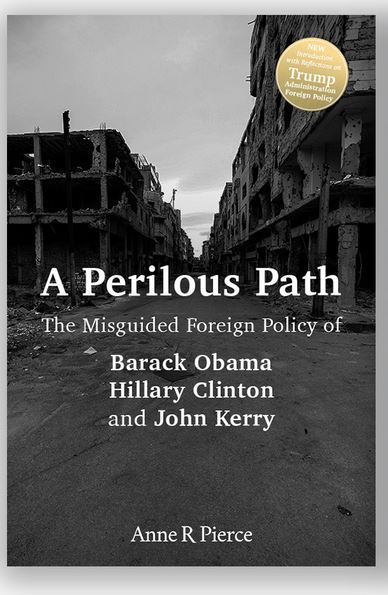Responding to Donald Trump’s bombastic rhetoric, Marco Rubio recently said, “The problem is presidents can’t just say anything they want. It has consequences here and around the world.” Positioning herself as “kind” compared to combative Republican opponents, Hillary Clinton recently said, “Boy does it matter, when you are president, what you say, and how the rest of the world hears you.” It matters indeed.
The speech, as well as the failure to speak, of presidents and their secretaries of state reverberates far and wide. Their words affect everything from human rights and political freedom to the confidence (or lack thereof) of enemies and allies, to national priorities and global standing, to the foreign policy “discussion,” to policies themselves. Clinton’s very use of the word “kind” shows that even a single word, carefully placed, can be used to alter public perceptions.
What we talk about bears directly on our actual position. It’s easy to choose morally bereft policy if no one points out moral imperatives. It’s easy to conciliate the wrong nations and groups if no one emphasizes their nefarious nature. We’re more comfortable ignoring atrocities when our leaders espouse moral equivalence, as President Obama, Secretary of State John Kerry, and Clinton frequently do. We’re more complacent in the face of radical Islamist gains when our president avoids identifying radical Islamist ideology, and when our secretary of state asserts, as Clinton did, that “ideology is so yesterday.” With experts insisting Cold War divisions were gone and that it was time to “engage” with former enemies, we didn’t mind at first that the Obama administration lacked a grand strategy.
In response to grave moral and strategic threats, Obama, Clinton and Kerry alternated between damaging silence, misleading innuendo and enabling verbal gestures. They were as mute as they were passive in response to the atrocities and bellicosity of the Syrian and North Korean regimes, the human rights violations and aggression of Russia and Iran, and the worsening persecution of Christians and Jews throughout the world. Brutal crackdowns on peaceful pro-democracy demonstrators elicited only occasional neutral requests that the “violence” on both sides stop. Blatant military provocations elicited “concern” and “consideration’ of future measures. As Iran marched toward nuclear weapons, Obama defended Iran’s “legitimate right” to a “peaceful” nuclear program. Kerry’s downplaying of the collusion between “moderates” and extremists in the Iranian government, and his prevarications about negotiated terms, helped him push a flawed nuclear deal.
Before extremism was a factor in the Syrian rebellion — and when promising policy options were still available — Clinton cited fear of aiding “extremists,” while Obama stoked fears of “boots on the ground,” as excuses for U.S. inaction. In spite of Putin’s invasion of Ukraine, unrepentant support of Assad, and military assault on anti-Islamic State rebels and Syrian civilians, the administration continually praised Russia for its “constructive role” in orchestrating Syrian “peace conferences.”
Talking about or, conversely, remaining silent about, political freedom can mean the difference between standing for something and inspiring many, and standing for nothing and inspiring few. Quiescence regarding the fate of people within Syria, Iran, Russia, China, Sudan, Venezuela, Cuba and elsewhere sends a message in itself. But it is not just silence that degrades American foreign policy; it is also misleading narratives.
Americans are naturally tempted to slouch toward isolationism when they are warned that active policies in volatile parts of the world lead to military entanglement. When the “chattering classes” regale us with lessons from the Iraq War, but fail to highlight other historical lessons, such as those we might derive from World War II and the Cold War, we are more susceptible to simplistic, misguided policies. We forget what happens when democracies ignore escalating atrocities and hostilities and appease aggressors. They’re often eventually forced to take military action by events spiraling out of control. We forget that peace can come through strength, and containment of those who would do us harm.
Making matters worse, President Obama often enacts policies without speech, without proposing them to Congress or defending them to the American people. He thereby avoids having to explain, justify or defend his approach to world affairs. Without vetting, unprincipled and unwise policies more easily slip by.
With our president getting away with such superficiality, presidential candidates and even debate moderators feel free to do the same. Most rarely address foreign policy and dumb it down when they do. With the public discussion so reduced, Americans who don’t look into things for themselves are susceptible to demagoguery. Trump’s assertion, “Wouldn’t it be nice if Russia could help us fight ISIS?” might seem reasonable to those unaware that Russia uses airstrikes to target anti-Islamic State rebels and civilians, and to bolster the Syrian regime. But, when Trump says that Kim Jong-Un “deserves credit” for consolidating power, that “Islam hates us” and that Vladimir Putin is a “highly respected man in world affairs,” it is up to his supporters to parse his words.
What presidents and secretaries of state say and what words they choose, whether they speak and what they speak about, is highly consequential and vitally important.
This article was originally published at Washington Examiner on March 20, 2016. Read the full article here.


